Balancing the Endocannabinoid System Without Cannabis
The Endocannabinoid System (ECS) is the body's primary regulatory system, and is extensively and constantly involved in regulating and balancing numerous functions. Endocannabinoid receptor sites are present in the brain, glands, organs, connective tissues, and immune system. In each tissue, the ECS works in different ways to maintain a stable internal environment (homeostasis) despite fluctuations in the external environment.
Though the ECS is named after the cannabis plant that inspired its discovery, your body continuously makes its own cannabis-like molecules called "endocannabinoids," and you can influence and enhance this production!
Activities that Enhance Your Body's Endocannabinoid Production:
Yoga
Meditation
Massage and acupuncture
Breathing exercises
Unstructured down time
Social interaction
Any enjoyable activity or exercise (animal studies show only enjoyable exercise promotes endocannabinoid production; otherwise, it's interpreted by the body as a stressor, reducing production).
Foods that Enhance the ECS:
Omega-3:6 Balance
A healthy ratio of omega 3:6 enhances ECS function, and lowers levels of inflammation in the body. Arachidonic acid (AA), an omega-6 fatty acid, acts as a precursor to the body's endocannabinoids, but too much AA or other omega-6's will down-regulate endocannabinoid receptors.
Food sources of omega-3 include:
Hemp seeds
Flax seeds and oil
Chia seeds
Walnuts
Sardines and anchovies
Salmon and tuna (not canned)
Eggs (pastured or high omega-3 only)
Foods that are Cannabinoid Helpers:
Some foods contain substances that are structurally similar to cannabinoids, while some inhibit the breakdown of the body's endocannabinoids, and others enhance endcannabinoid production or the function of the ECS. These include:
Dark chocolate and raw cacao
Lemon balm
Black pepper
Hops
Oregano
Maca
Nutmeg
Cloves
Cinnamon
Ginger
Kava kava
Truffles
Echinacea
Camelia sinensis
Turmeric
Electric daisy
Helichrysum
Eat Clean and Avoid Processed Foods
Certain pesticides (e.g. chlorpyrifos and piperonyl butoxide) are known to disrupt the endocannabinoid system. Always opt for organic when shopping for:
Phthalates Shmalates
Phthalates are a group of chemicals used in manufacturing toys, vinyl flooring/wall coverings, lubricating oils, food packaging, plastics, medications, blood bags/tubing, detergents, and personal care products (Ex: nail polish, hair spray, lotion, soap, shampoo, perfume, other fragrances and much more).
Tips for Avoiding Phthalates:
Ditch plastic wherever possible, particularly with recycling codes 3 and 7, and never heat food in, or add hot food to plastic containers.
Eat organic whenever possible since phthalates are used in pesticides and are found in fertilizers used in conventional farming.
Avoid products that contain "fragrance" or "parfum" since these are likely phthalates. Instead, choose fragrance that boasts "phthalate-free" or "no synthetic fragrance."
Filter your water to remove DEHP, a type of phthalate used in water pipes to prevent corrosion.
Summary:
Like any of the regulatory functions and systems in the body, it all comes down to balance. Managing stress and eating a healthy, balanced diet, while minimizing your exposure to toxins are all key to achieving and maintaining optimal function.
If you experience mood disorders, chronic inflammation or pain or other signs that your body is out of balance, addressing lifestyle factors should be first on the list. To achieve balance more quickly, consider short-term use of full-spectrum hemp oil.
